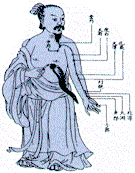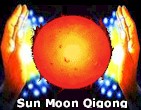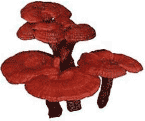
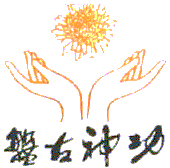

by Ricardo B Serrano, Dipl.Ac., author of
Meditation and Qigong Mastery
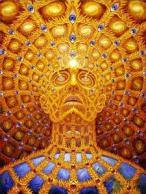  Oneness with Being, Now or Presence
 The following excerpts from the book Five Elements & Ten Stems supported by the classics Nan Ching, Ling Shu and Huang Jing Ching show the importance in cultivating Qi energy in the Hara and its energetic pathways through Qigong, meditation, herbs, diet, exercise, acupressure, and acupuncture for stress management, holistic health and well-being: The energies of the Heaven <-> Man <-> Earth continuum are assimilated and drawn into the Hara. Located in the abdomen, the center of the body, the Hara is the central point for all of these energies. The Hara is described as the realm of the "Moving Chi between the Kidneys" and is centered around the "Sea of Chi," Chi Hai or Tanden and the umbilicus. This understanding is found in some of the earliest texts. In the Huang Jing Ching, or "Yellow Jing Textbook," the following description is given.
The Nan Ching specifies the source of Chi as the Hara and the Breath. The Ling Shu ties both the Breath of Heaven and the Chi of food and water to formation of the true Chi. This quote from the Nan Ching tells us that the "source of vital Chi" is the Hara:
Wang Shu He, who wrote a little known but brilliant treatise on the Nan Ching, explicitly states when commenting on this section of the Nan Ching that air when drawn into the abdomen creates Chi:
This passage is very similar to the preceding quotation from San Dai Ji Jin Wen Tsun. Both emphasize the distention of the abdomen as air is drawn in from proper breathing. it would follow that the solidity mentioned by each is the elastic flexibility of a healthy Hara. According to information from the Ling Shu, the energies of Heaven <-> Man <-> Earth interact to form the True Chi. One aspect or equivalent of True Chi is the Source Chi. It is in the Hara, the area of "the Moving Chi between the Kidneys," that all energies interact to create the basic or Source Chi of the body:
The idea of energies coming down to the Hara or Chi Hai (Tanden) pervades the classic references. The Hara was seen as the merging point of the various energies and the source of True Chi. One aspect of this Chi forms, creates, or becomes the Five Elements energies. More precisely, this aspect of the energies presents, creates, or becomes the Ten Stems energies which are described by the Five Elements system. A second or additional aspect of this Basic or Source Chi forms, creates, becomes or nourishes the twelve meridians (The Twelve Branches). The energetic anatomy is clear. The Hara is the center, the ultimate source of Chi. The Triple Warmer is the energetic connection of the Hara to the Source points of all the meridians. It is the "root" of health and life. Before any other treatment is administered, we need to treat the condition of the Hara. 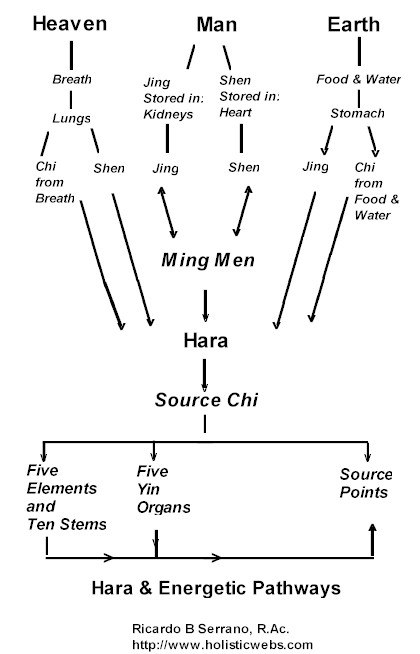 The Nan Ching theory of energetic anatomy is centered in the Hara. The energetic nourishment of Jing and Shen, the passage of Chi and maintenance of the pulse are not the only functions rooted in the Hara. The Gathering of Eminent Acupuncturists and the Compendium of Acupuncture and Moxibustion discuss how the Ten Stems relate to the Source points. At the same time they present another viewpoint on the relationship of Triple Warmer and Heart Main-Pericardium to the Ten Stems. Recognition of the Hara as the "Root," the center, pervades the practice of acupuncture and all other ideas based on the classical concepts of health. As the center of the energetic system and the starting point from which many techniques of diagnosis and treatment are developed it completes or supplements the Five Elements system. The Hara itself is seen as an area that encompasses the whole abdomen. It is focused around the area called Chi Hai or Chi Hai Tanden which overlaps the Spleen and Kidney reflex areas centering around CV-5 and CV-6, the Ma Point of the Triple Warmer and the "Sea of Chi." 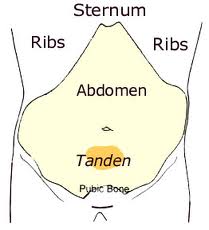 Hara, Dantien or Chi Hai Tanden Reference: Five Elements and Ten Stems by Kiiko Matsumoto and Stephen Birch, 1983.
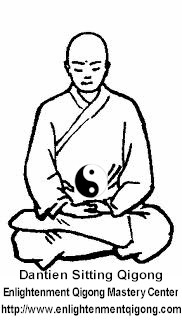 Hara (Dantien) Sitting Qigong combined with Maitreya (Shiva) Shen Gong Qigong healers and meditation masters use this Hara (Dantien) Sitting Qigong technique – a Taoist form of lower dantien breathing combined with postures – for self-healing (insomnia, low energy, digestive problems, etc) improving organ functions, quieting the mind, inner peace, internal martial arts application, centered and present in the power of now, expanded awareness, joy, and cultivating Qi energy for blissful enlightenment.
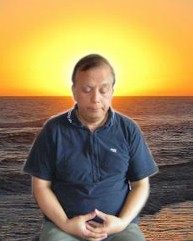 Hara (Dantien) sitting Qigong
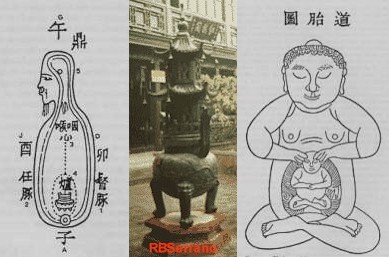 Taoist Inner Alchemy
The man with belly is centered, tranquil, balanced. He is "large minded, one who is magnanimous and warm hearted." Conversely, the man without a belly lacks calm judgement. He reacts haphazardly and capriciously. He is easily startled and nervous... he lacks that inner axis which would prevent his being thrown off center. "The man with no belly is in every respect a picture of immaturity." Traditionally then for the Japanese, hara, the belly, meant strength, maturity and a tranquil mind.
"The Oriental man is very empty and light up here in the head and very heavy down here in the belly and he feels very secure. The Western man is light in the belly and very heavy up here in the head, so he topples over." In Tai Chi Chuan, Qigong and other eastern martial arts the center of gravity (Aikido with Ki) is located in the lower belly, and the reservoir of Life Energy or Breath Energy is also in the lower belly. From this "single spot in the lower abdomen" movement begins and energy is made. This spot is revered as the source of life in man. In Taoist yoga it is pictured as a burning cauldron producing the energy needed to open up and liberate the rest of the body. 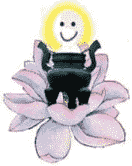
To energetically align yourself with the universal Qi or become one with universal Qi of heaven and earth – experience Qigong state, lower dantien breathing with awareness of the three dantians aligned must be integrated with the postures or movements of Tai Chi, Qigong or eastern martial arts because when our practice harmonizes breath, postures or movements and hara (lower dantian) meditation we become Self-realized beings at one with the Dao. See Lower Dantian Breathing, Hara Qi-healing, and Three Dantians
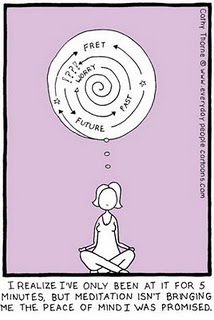 It would be difficult to overstate the importance of the Dantian. Any question of its centrality to life and health is obviated by Chi Po's answer to the Yellow Emperor in the Nan Jing: "The Yellow Emperor asked: 'The pulse is normal, and yet sometimes people die, why is this?' Chi Po answered, 'Each of the twelve meridians has a relationship to the vital energies, the living Qi. The source of the vital energies is the root-origin of the twelve meridians and the Moving Qi between the kidneys, the Dantian. This means that the source of the vital energies is fundamental to the five Yin and six Yang organs, the root of the twelve meridians, the gate of breathing. It is the source of or origin of the Triple Warmer. Another name for it is the Protecting Shen Against Evil; and therefore Qi is the root of the person. This is why if the root is dying, the Stems and Branches (meridians and organs) will be dying, yet appear normal. The vital Qi is dying inside, but it is still there on the outside (the pulse is normal).'" 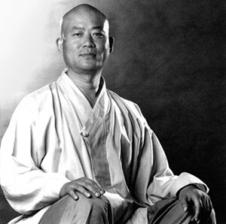 Tancheon or Lower Dantian Breathing
Distracted thinking and worrying are dissipated when you focus your mind on the lower dantian. Correct lower dantian breathing provides a person with energy. When the energy is full then the head becomes clear and the heart gets brighter. When the body is charged with vitality the mind gets clear and the heart becomes brighter. When the mind is clear the body becomes lively and vitality is abundant. Tancheon or Lower Dantian Breathing is a method that produces mental and physical health by working with the body, mind, and heart. The body's vitality is called jing centered in the lower dantian. The power that makes mental activity possible is called Qi. The energy of the heart is called shen. All three spread throughout the whole body. The relationship between them can be compared to a candle. Jing is the candlestick, Qi is the flame, and Shen is the light that emanates from the flame. The flame becomes greater when the candlestick is bigger.The light is brighter when the flame is greater. Thus, when Jing is abundant Qi becomes greater and when Qi is great Shen becomes brighter. The basic principle of Sun Do Tancheon or Lower Dantian breathing practice is to make Jing abundant, Qi greater, and Shen brighter 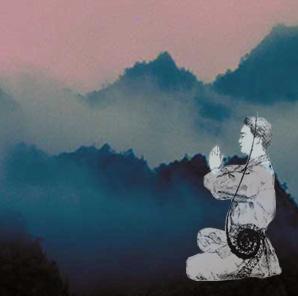 Sun Do Tancheon or Lower Dantian Breathing 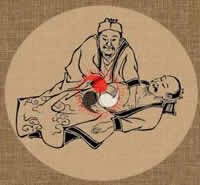 Hara Qi-healing According to Kiiko Matsumoto's Hara Diagnosis: Reflections on the Sea, "We can see here an immediate and simple diagnosis, the examination of the breathing ability. If the breathing is shallow and does not reach into the abdomen, the nourishment that the moving Qi needs is not adequate. Practice of deep breathing is therapeutically useful, providing immediate relief and a source of energy for the moving Qi. The "gate of breathing" is an important Daoist concept. We can understand ming men as a concept intimately involved with the Nan Jing idea of a gate of breathing. This also parallels the idea of the hun from heaven and po from earth entering at birth and returning to heaven and earth at death. Similarly, the source, the root of the twelve meridians, is the place where earth's energy reacts with heaven's energy. This may be why the meridians were named the twelve branches in relation to the cosmological concept of terrestial branches. In effect, the source is the point of interaction for the cosmological energies that comprise men. The moving Qi between the kidneys is the "shen that protects against evil." This establishes for us the relationship between the moving Qi and the shen that the classical texts tell us is stored in the heart. However, this idea is more intricate. In his commentary on this idea, Sosen Hirooka says:
This attraction of "heaven Qi" into the person and the resultant creation of shen which protects the body is part of breathing. When breathing is correct, this process functions well. Like most concepts that relate to the source, this idea has multiple applications. Correct breathing may be utilized for good health and is the root of Daoist contemplative practices. The moving Qi is also the origin of the triple warmer. According to the Nan Jing, this relationship is quite complex. The triple warmer transports source Qi from its origin to the source points of each of the twelve meridians. Chapte 66 of the Nan Jing states: Thus, it maintains the basic energetic connection of the twelve meridians to the source." 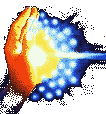 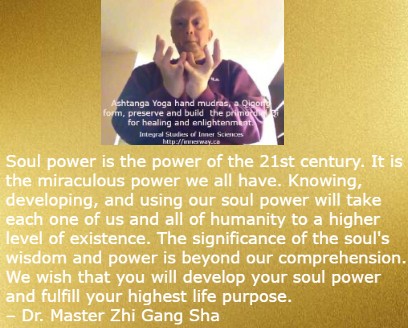 Soul power is developed and used by Tao Healing Hands Practitioner 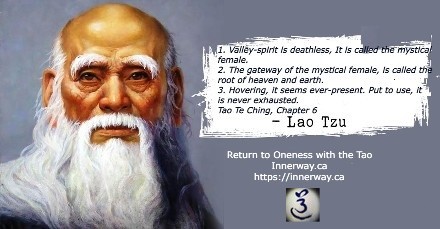 How to build your Soul Lightbody 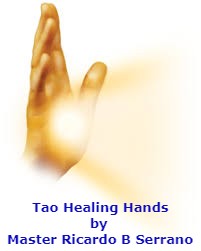
For preventive health maintenance, stress management and spiritual awakening, breathing with postures, meditation and Qigong are taught to clients together with Qi-healing, acupuncture, acupressure and herbs mainly to cultivate the Three Treasures Jing, Qi and Shen. See Qigong Mastery in PDF format, and Vancouver Qigong Mastery
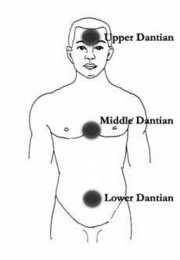 Three Dantians The Three Dantians: There are three major energy centers in the human body along the Taiji Pole (center channel) that store and emit energy. These Three energy centers in Ancient Daoist Energetic Anatomy and Physiology are called the three dantians. Located in the lower abdomen, chest, and head, each dantian has its own function and properties. The Lower Dantian - The Lower Dantian is the center of physical strength and stamina and is located in the center of a triangle formed in your pelvic bowel by drawing a line from your perineum, navel, and mingmen (lower back). The lower dantian is also responsible for kinesthetic feeling, awareness, and communication. Expert martial artists learn to become familiar with this important energy center to feel and anticipate an opponent s attack. This energy center houses the mind that gets subconscious feelings or gut feelings that the logical mind cannot process. All Qigong training begins with focusing on the Lower Dantian in order to develop familiarity with remaining rooted by gathering the body s Qi and strengthening the foundation of the body s energy. The Lower Dantian is considered the most yin energy center of the three dantians. This Dantian is closest to the Earth (yin) and is associated with the Jing (essence) and the physical energy of the body. Because the lower dantian is closest to the Earth it naturally gathers and stores the Earth s yin energy which counter balances the great yang energy cultivated during Qigong practice. The first Wei Qi field (energy field) is associated with the lower dantian and is the closest to the physical tissue. Because the Lower Dantian represents Jing (essence) and matter, it is only natural that the first Wei Qi field only extends a few inches past the physical tissue. The Middle Dantian - The Middle Dantian is the center of emotional energies in the human body and is located in the chest area. This Dantian is capable of emotional communication through the empathy of the heart, which means that one can read the emotions of another. Often times Qigong practitioners will focus on training the Middle Dantian to release psycho-emotional patterns. If enough emotions are brought to surface suppressed memories of traumas, which created certain daily behavior and emotional patterns, will manifest. In doing this a Qigong Practitioner will choose to address these issues by intercepting karma, taking responsibility, and projecting no blame. Then the healing occurs in the main organ related to the Middle Dantian, the heart. The heart is responsible for forgiveness and is the final stage of healing after addressing all emotions and boundaries created by traumas. This type of practice will often times bring about ego or spiritual deaths where a practitioner will completely change their life, change their energetic resonance and change friends, and increase energetic potential for it takes energy to suppress emotions. The Second Wei Qi field is associated with the Middle Dantian and manifests roughly two to three feet distance from the physical tissue. For people who see Auras, this is the Wei Qi field in which the colors of emotions are seen within. The Upper Dantian - The Upper Dantian is the center for intuitive awareness, psychic abilities, and spiritual Communications. Daoist Mystics and Alchemists have interest in the Upper Dantian for the Crystal Chamber in which is where psychic perceptions take place. Even though psychic abilities take place here, it is necessary to have all Three Dantians balanced for a more proper and effective perceptions. When peaceful, tranquil, and not disrupted by emotional troubles of the subconscious mind, a Qigong student can intuitively process information taken in by the universe. This ability is to know without knowing and is useful for observing the subconscious patterns of the practitioner and others. Because the Upper Dantian is related to the Shen (spirit) as well as the 6th, 7th, and 8th chakras, it is used to spirit travel. The Third Wei qi Field is associated with the Upper Dantian and manifests from six feet to infinite space. The Upper Dantian is related to Shen (spirit) and thought. 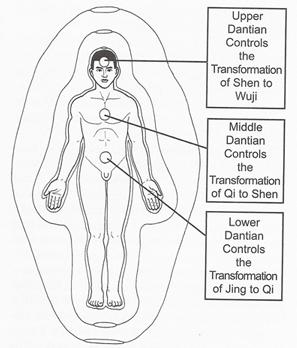 Caution: Do not practice Shen Gong exercises to open psychic abilities and intuitive awareness without first training the Lower Dantian to root to avoid self induced energetic psychosis. Sources:
 to join Qigong Mastery Center on Facebook to join Qigong Mastery Center on Facebook
See Enlightenment Qigong Forms for Returning to Oneness, Shaktipat Meditation, Chinese Tonic Herbs to Cultivate Shen, Qi & Jing, The Power of Now and the End of Suffering


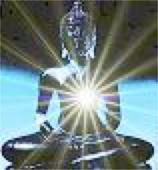 Maitreya Shen Gong
 Learn more about Shaktipat meditation in the Maitreya (Shiva) Shen Gong ebook

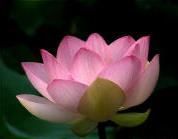 Qigonghealer.com

  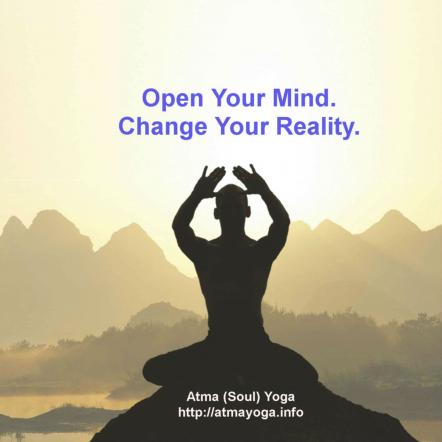 Meditation and Qigong books and DVDs on Functional Medicine Akashic Records Reading with Tao Chang book at https://www.amazon.com/dp/0988050285 Six healing Qigong sounds with Mantras book at https://www.amazon.com/dp/0988050269 The Meditation and Qigong Mastery book at https://www.amazon.com/dp/0987781901 Return to Oneness with the Tao book at https://www.amazon.com/dp/0987781960 Return to Oneness with Spirit through Pan Gu Shen Gong book at https://www.amazon.com/dp/0987781979 Keys to Healing and Self-Mastery according to the Hathors book at Return to Oneness with Shiva book at Oneness with Shiva book at The Cure & Cause of Cancer book at
To order the Maitreya (Shiva) Shen Gong & Omkabah Heart Lightbody Activation DVDs with shipping, cost $60, with a 2-page Healing Conscious Mind Encodements (pdf) enclosedplease click the Paypal button below:
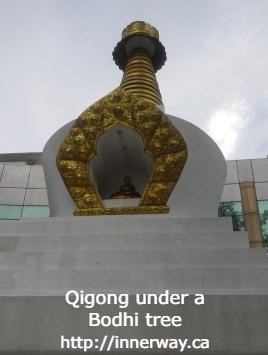 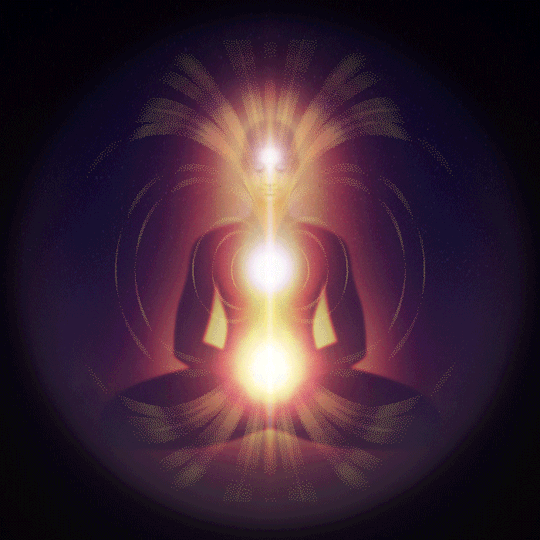 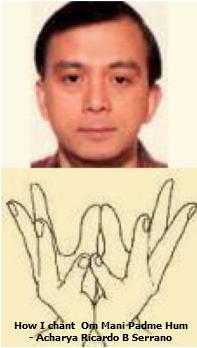 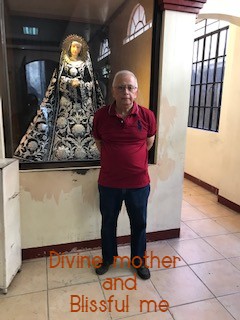 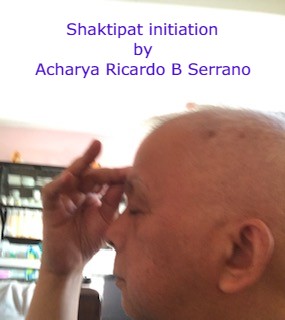 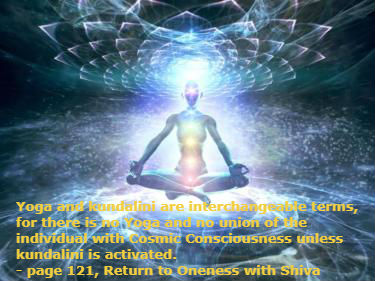 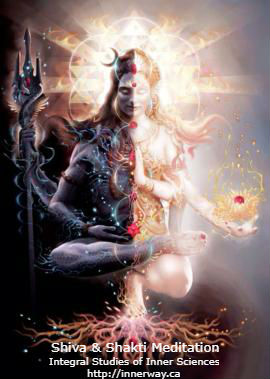 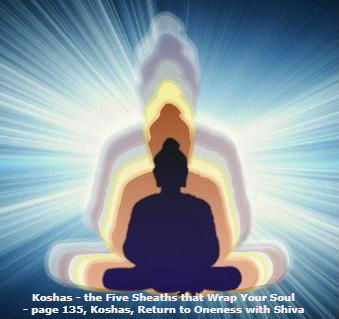 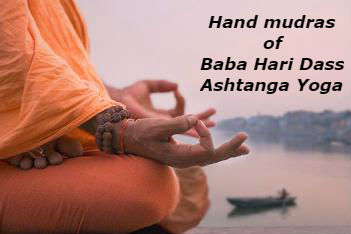 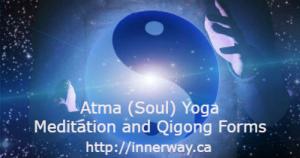

  Contact qi-healer@qiwithoutborders.org Updated May 26, 2011 by  |
 Why does the Hara (Dantian) sitting Qigong work? From a Taoist qigong point of view, it works because the Three Treasures - Jing, Qi and Shen - are cultivated. The Jing (essence) and Yuan Qi (vitality) stored in dantian and lower energy centers and gathered through the practice of Hara (Dantian) sitting Qigong and various Enlightenment Qigong forms with Chinese tonic herbs supplementation are utilized by the higher energy centers to develop the Shen (Spirit) energy.
Why does the Hara (Dantian) sitting Qigong work? From a Taoist qigong point of view, it works because the Three Treasures - Jing, Qi and Shen - are cultivated. The Jing (essence) and Yuan Qi (vitality) stored in dantian and lower energy centers and gathered through the practice of Hara (Dantian) sitting Qigong and various Enlightenment Qigong forms with Chinese tonic herbs supplementation are utilized by the higher energy centers to develop the Shen (Spirit) energy.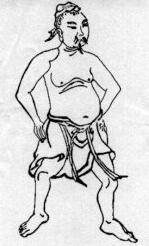 According to Karlfried Durckheim s Hara: The Vital Center of Man, "Hara implies for the Japanese all that he considers essential to man s character and destiny. Hara is the center of the human body. lt is at the same time the center in a spiritual sense or, to be more accurate, a nature given spiritual sense."
According to Karlfried Durckheim s Hara: The Vital Center of Man, "Hara implies for the Japanese all that he considers essential to man s character and destiny. Hara is the center of the human body. lt is at the same time the center in a spiritual sense or, to be more accurate, a nature given spiritual sense." 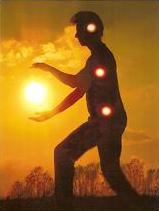 Al Huang in his book Embrace Tiger, Return to Mountain describes the difference between the Oriental and the Western man:
Al Huang in his book Embrace Tiger, Return to Mountain describes the difference between the Oriental and the Western man:  NOTE: To have and maintain a powerful rooting and grounding like a tree, the middle (heart center) and upper dantians (ni-wuan) are aligned with the Hara (lower dantian). The three dantians are all important because without alignment and activation of the three dantians, the power and stability of the TaiJi pole in the center of the body cannot be manifested and maintained.
NOTE: To have and maintain a powerful rooting and grounding like a tree, the middle (heart center) and upper dantians (ni-wuan) are aligned with the Hara (lower dantian). The three dantians are all important because without alignment and activation of the three dantians, the power and stability of the TaiJi pole in the center of the body cannot be manifested and maintained. 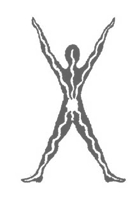 Psychological stability and healing is difficult and requires practicing correct breathing. Earth energy and heaven energy meet in the lower dantian. The lower dantian generates energy and is similar to an electric generator. Energy is generated by the lower dantian and becomes the source of thinking, talking, and acting.
Psychological stability and healing is difficult and requires practicing correct breathing. Earth energy and heaven energy meet in the lower dantian. The lower dantian generates energy and is similar to an electric generator. Energy is generated by the lower dantian and becomes the source of thinking, talking, and acting.

